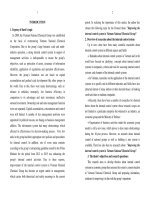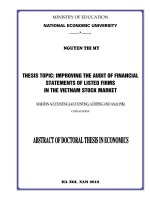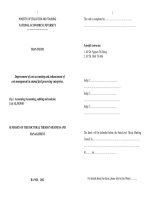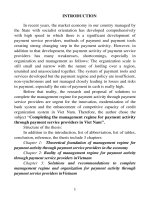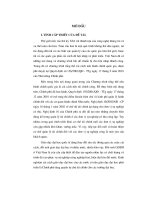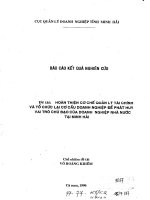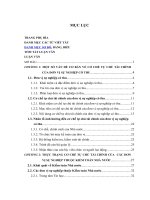TÓM tắt TIẾNG ANH hoàn thiện cơ chế quản lý tài chính đối với các trường đào tạo sĩ quan quân đội
Bạn đang xem bản rút gọn của tài liệu. Xem và tải ngay bản đầy đủ của tài liệu tại đây (228.28 KB, 27 trang )
MINISTRY OF EDUCATION AND TRAINING
MINISTRY OF FINANCE
ACADEMY OF FINANCE
LAI VAN TUNG
PERFECTING THE FINANCIAL MANAGEMENT MECHANISM
FOR MINITARY OFFICER TRAINING SCHOOLS
Major : Finance - Banking
Code : 9.34.02.01
SUMMARY OF ECONOMIC DOCTORAL THESIS
HANOI - 2018
The work has been finished
at Academy of Finance
Supervisors:
1. Assoc. Prof. Ph.D. Vu Van Tung
2. Assoc. Prof. Ph.D. Le Hung Son
Reviewer 1:
........................................................
........................................................
Reviewer 2:
........................................................
........................................................
Reviewer 3:
........................................................
........................................................
The Thesis will be defended berfore the Thesis Review Board
at the Academy level, of Academy of Finance
at ..... ....hour.... .....(day)......(month)....... . ....(year) 2018
The Thesis can be referred at:
- The National Library
- The Library of Academy of Finance
1
INTRODUCTION
In the context of limited State Budget spent in the field of National
Defense - Security, and complex and difficult tasks of National Defense in
the new situation, the financial source invested in military officer training
schools cannot meet the true demands. The question here is how to
effectively mobilize, create and manage, use different financial resources
to meet various training requirements in the immediate and long term. To
successfully accomplish this goal, a number of factors, including the need
for an appropriate financial management mechanism are required. The
topic of “Perfecting the financial management mechanism for military
officer training school” selected for further study to complete the financial
management for military training schools is objectively important and
essential both in terms of theory and practice.
2. Research objectives of the Thesis
From the foundation of theoretical and practical research, the thesis
proposes some solutions to improve the financial management mechanism
for military officer training schools.
3. Research tasks of the Thesis
- To systematize, contribute to clarifying and supplementing
theoretical basis of education and training in the Army and the financial
management mechanism for military officer training schools;
- According to the survey results, to analyze and evaluate the current
situation of the financial management mechanism for military officer
training schools, to withdraw the strengths and limitations or shortcomings
and their causes; then to propose a number of measures and
recommendations to perfect the financial management mechanism for
military officer training schools in the coming future.
2
4. Research objects and scope of the Thesis
4.1. Research objects of the Thesis
The research objects of the Thesis are a number of theoretical and
practical issues on the financial management mechanism for military
officer training schools.
4.2. Research scope of the Thesis
- In terms of contents: The Thesis studies different issues on the
financial management mechanism for military officer training schools,
including: financial source creating mechanism; financial management and
use mechanism; asset management mechanism; and financial inspection
and control mechanism.
- In terms of space: The Thesis studies the financial management
mechanism for different military officer training schools. The financial
management mechanism for military officer training schools mentioned in
this Thesis is the financial management mechanism in a limited sense, that
is to study the financial management mechanism issued by the State only;
such mechanisms developed by the schools are the internal control of each
school, and not be covered by this Thesis. The Thesis focuses its research
in 10 schools, namely: 07 schools under the Ministry of National Defense
and 03 schools under different Army forces.
- In terms of time: The Thesis studies the process of developing and
operating the financial management mechanism for military officer
training schools, mainly focusing on the current financial management
mechanism (which is in place until the time of Thesis defense). The
analyzed date for the research are mainly in the period from 2011 to 2016.
3
5. Research methods of the Thesis
- General method: The Thesis makes use of the methodology of
dialectical materialism and historical materialism to study different issues,
to ensure comprehensive, systematic, logical and practical results.
- General method: synthesis, analysis, comparison, statistics, logical
inference, generalization..
6. New contributions of the Thesis
- Develop the theoretical basis of educational and training activities
in military officer training schools and the financial management
mechanism for military officer training schools.
- Propose a system of solutions contributing to perfecting the
financial management mechanism for military officer training schools in
line with training characteristics.
7. Structure of the Thesis
Apart from the introduction, conclusion, diagrams, tables, appendices
and references, the Thesis consists of 4 chapters:
Chapter 1: Overview of existing research projects related to the
Thesis
Chapter 2: Education and training in the Army and the financial
management mechanism for military officer training schools
Chapter 3: Current situation of the financial management mechanism
for different military officer training schools.
Chapter 4: Measures to perfect financial management mechanism for
military officer training schools.
4
Chapter 1
OVERVIEW OF EXISTING RESEARCH PROJECTS RELATED
TO THE THESIS
1.1. RESEARCH RESULTS RELATED TO THE THESIS TOPIC
In recent years, there have been many research topics and works on
Education and training, in general and the financial management in the
area of Education and training, in particular. Previous studies listed,
analyzed in the overview of the financial management mechanism have
partly solved the issues related to the financial management mechanism for
public education and training institutions.
1.2. REVIEW ON RESEARCH RESULTS AND ORIENTATIONS
1.2.1. Some values to be acquired
These researches provide the author with a fairly comprehensive and
insightful theoretical foundation on Education and training and the
financial management mechanism for Education and training institutions
as a basis to develop a theoretical basis on the financial management
mechanism for military officer training schools.
1.2.2. Issues related to the Thesis which have not been addressed
or solved in other studies
- There is no clear analysis of the relationship between the training
characteristics of the military schools and the issues that these researches
work.
- The components of the the financial management mechanism for
public education institution have not been fully analyzed.
- There is no study working on improving the financial management
mechanism for military officer training schools.
5
1.2.3. Research questions
To achieve the research purposes, the Thesis should analyze the
theoretical and practical basis in order to answer the following research
questions: What are the training characteristics of military officer training
schools? How do these characteristics affect the financial management?
What are the components of the financial management mechanism for
different military officer training schools? What is the current situation of
the financial management mechanism for military officer training schools?
What are the mechanisms to improve the mobilization of financial sources
for military officer training schools? How to obtain the strict control and
management of the upper levelsand to improve the autonomy, selfresponsibility of the schools in financial management at the same time.
Should military schools move toward performance-based budget
management? What are obstacles and solutions to overcome these
obstacles?
1.2.4. Research orientation of the Thesis
Based on the research overview, and the addressed research gaps and
research questions, the Thesis should further clarify the theoretical basis of
the financial management mechanism for the military officer training
schools; analyzing the current state of the current financial management
mechanism for military officer training schools; identifying the results,
limitations, and analyzing the causes of these limitations, and
shortcomings of the financial management mechanism for the military
officer training schools; proposing solutions to perfect the financial
management mechanism for the military officer training schools, which
are in line with the State financial management mechanism and specific
training characteristics of the military officer training schools.
6
Chapter 2
EDUCATION AND TRAINIGN IN THE ARMY AND THE
FINANCIAL MANAGEMENT MECHANISM FOR MINITARY
OFFICER TRAINING SCHOOLS
2.1. EDUCATION AND TRAINING IN THE ARMY
2.1.1. Some relevant concepts
2.1.1.1. Education and training
2.1.1.2. Military officer
Military officers are the servicemen serving in the armed forces with
the army rank of ensign or higher.
2.1.1.3. Military officer training
Military officer training is an activity of the Army in order to provide a
source of commanding officers and professional technicians with sufficient
qualities, capabilities and qualifications according to specific training
discipline, meeting the requirements of long-term service in the Army.
2.1.1.4. Military officer training schools
Military officer training schools are education and training
institutions in the Army which are assigned to train military officers for
long-term service in the Army.
2.1.2. The role of education and training in the Army
2.1.2.1. Education and training in the Army contributes to developing
a good source of officers with basic knowledge of military science, meeting
the requirements of military construction in the new period.
2.1.2.2. Education and training in the Army contributes to
educating national defense and security knowledge for senior officers,
pupils
and
students;
training
the
industrialization and modernization time.
human
resources
for
the
7
2.1.3. Characteristics of the military officer training activities
2.1.3.1. Army’s-demand-based training is the primary.
2.1.3.2. Training associated with military activities - the special
activities.
2.1.3.3. There is no competition among different schools.
2.1.3.4. Training products are comprehensive.
2.1.3.5. The schools manage the students as the full-time basis.
2.2. THE FINANCIAL MANAGEMENT MECHANISM FOR
MINITARY OFFICER TRAINING SCHOOLS
2.2.1. The concepts of the financial management mechanism for
military officer training schools
The financial management mechanism for military officer training
schools is a comprehensive set of principles, methods and measures to
develop, distribute, use and control the use of the financial resources for
military officer training schools for the purpose of achieving preset goals
in education and training.
2.2.2. Some methods of financial management for military officer
training schools
2.2.2.1. Financial autonomy and non-autonomy
a) Financial autonomy
In case of financial autonomy, schools are able to identify their own
revenue sources and ability to cover operating costs from these revenue
sources. Financial autonomy allow schools to give their own decisions on
different financial issues at different levels.
b) Financial non-autonomy
In case of financial non-autonomy, during the course of operation, all
amount of school’s revenue shall be remitted into the State Budget and the
8
demands of State Budget spendings shall be distributed in the annual State
Budge spending plan.
2.2.2.2. Input-based management and performance-based management
a) Input-based management
b) Performance-based management
2.2.3. Components of the financial management mechanism for
military officer training schools
2.2.3.1. Mechanisms of developing financial sources for schools
a) Mechanisms of developing State Budget sources
* Regarding the level of State budget funding for military officer
training schools
All military officer training activities in Vietnam are 100%
guaranteed by the State Budget (the Central budget funds via the Ministry
of National Defense). This is also the common trend of other countries
around the world and in line with the specific characteristics of military
occupation.
* Regarding the guarantee methods of State budget funding for
military officer training schools
- The State guarantee the budget for the schools.
- The State makes use of the Budget to directly guarantee for learners.
b) Mechanisms of creating non-state-budget financial sources
Non-state-budget financial sources.
Non-state-budget financial sources of military officer training
schools are developed from: Tuition fees of civil levels and training links;
From different revenue-generating activities according to the
characteristics of each school; Contribution and support from
organizations, enterprises and individuals; international funding and
investment
9
* Regarding revenue-generating activities of military officer training
schools
Currently, the revenue-generating activities of the Army in general
and of military officer training schools in particular need to be maintained
for the following reasons:
First, some of the revenue-generating activities in the Army are not
merely economic, but directly serving the training of soldiers, some of which
must be maintained in a manner consistent with the management of soldiers.
Second, economic activities contribute to reducing the burden of
State budget expenditures for the Army
Third, economic activities are characterized by taking advantage of
redundant power, ensuring savings and avoiding waste
Fourth, some of the school’s revenue-generating activities actively
give great supports to professional activities
* Some principles of developing non-state-budget financial sources
for military officer training schools
Principle 1: Follow the State regulations and laws; Principle 2:
Developing non-state-budget financial sources from revenue-generating
activities of the schools must be completely independent from the State
budget; Principle 3: Development of non-state-budget financial sources
must be performed in the manner of autonomy and self-responsibility;
Principle 4: Activities to develop non-state-budget financial sources must
be fully accounted, publicized and transparent; Principle 5: Fully fulfill all
payment obligations to the State budget; Principle 6: Revenue-generating
activities must be maintained in a reasonable model.
2.2.3.2. Financial management and use mechanism
a) Management and use of the State Budget
Requirements of State budget management and use of different
management methods are different:
10
Regarding the input-based budget management method, all State
budget expenditures shall ensure the maintenance of the staff
organizational structure according to their assigned functions and tasks,
ensuring material infrastructure and other necessary conditions for
teaching, studying and scientific research activities.
Regarding the performance-based budget management method,
schools focus on the management of achieving the committed results,
clarifying the school’s undertakings to meeting the goals that have been
committed to its management agency.
b) State budget settlement
Any State budget expenditures can only be settled when they meet
the requirements of budget expenditures.
c) Mechanisms of management and use of non-state-budget revenues
The management mechanism for non-state-budget revenues must be
relatively flexible so that the schools are autonomous and accountable in
the management process. At the same time, it is necessary to have a
mechanism of binding responsibility; to meet the requirements of publicity
and transparency in the development of financial sources and use of nonstate budget revenues.
2.2.3.3. Asset management mechanism
The asset management mechanism shall satisfy the following
requirements: (i) The use of assets must be reasonable, for right purposes,
in accordance with the standards of norms, for capacity maximization and
good management and firmly understand and control the asset situation in
terms of quantity, quality and value;(ii) to establish and develop a set of
standards and norms...
2.2.3.4. Financial supervision and control mechanism
a) Self-control mechanism
b) Expenditure control mechanism based on the State budget
c) Inspection and examination activities of competent agencies
11
2.2.4. Roles of the financial management mechanism for military
officer training schools
2.2.4.1. Financial management mechanism contributes to
developing the financial sources for the school’s operations and
performance.
2.2.4.2. Financial management mechanism helps the financial
management and use of the schools to be more effective
2.2.4.3. Financial management mechanism
supervision of financial management and use
enhances
the
2.3. EVALUATING THE FINANCIAL MANAGEMENT MECHANISM
FOR MINITARY OFFICER TRAINING SCHOOLS
2.3.1. Validity
2.3.2. Efficiency
2.3.3. Economy
2.3.4. Equality
2.4. SOME FACTORS AFFECTING THE DEVELOPMENT AND
OPERATION OF FINANCIAL MANAGEMENT MECHANISM FOR
MINITERY OFFICER TRAINING SCHOOLS
2.4.1. Objective factors
2.4.1.1.
environment
Socio-economic,
national
defense,
and
security
2.4.1.2. The process of financial reform in general, public financial
reform in particular
2.4.1.3. The Party’s and State’s policies on the Army development,
policies on education and training in the Army, orientation of the
reorganization of military schools
2.4.2. Subjective factors
2.4.2.1. Awareness of senior managers in the Army
2.4.2.2. Organizational structure, staff capacity and technical facilities
12
2.5. EXPERIENCES OF THE MINISTRY OF PUBLIC SECURITY
IN THE CONSTRUCTION AND DEVELOPMENT OF FINANCIAL
MANAGEMENT MECHANISMS FOR UNIVERSITIES
2.5.1. Regarding the reorganization of the system public security
schools
2.5.2. Regarding the asset management mechanism
Chapter 3
CURRENT STATUS OF THE FINANCIAL MANAGEMENT
MECHANISM FOR MILITARY OFFICER TRAINING SCHOOLS
3.1. OVERVIEW ABOUT MILITARY OFFICER TRAINING
SCHOOLS
3.1.1. Current school organizational system in the Army
3.1.2. Training objectives
3.2. CURRENT STATUS OF THE FINANCIAL MANAGEMENT
MECHANISM FOR MILITARY OFFICER TRAINING SCHOOLS
3.2.1. Financial source development mechanism
3.2.1.1. Mechanism of developing State budget sources
a) Procedures of preparing State budget plans
Step 1: Guiding the preparation of State budget plans and reporting
the estimated amount for State budget plan (review number); Step 2:
Preparing State budget estimates of the schools; Step 3: Distributing State
budget estimates to the schools.
b) Procedures of preparing State budget plans
According to specific characteristics of each expenditure, State budget
estimates for each items are identified based on the following methods:
Method 1: Spending is calculated based on norms, standards, while
quantity and time must be committed.
13
Method 2: Spending is calculated based on performance charges for
each specific task and work with the following formula:
Method 3: Spending is calculated based on the performance amount
(or estimated performance amount) of the previous year and other
changeable factors.
Method 4: Spending is calculated based on estimated cost (total
estimate or estimate) and schedule of each project (works, work items) in
the planned year.
c) Budget modification and supplement
The high rate of budget deficit reflects the instability in the
preparation and allocation of budget estimates, then the “ask-give”
mechanism will be prominent.
3.2.1.2. Mechanisms of creating non-state-budget financial sources
a) Tuition fees for civil training programs
b) Other non-state-budget revenues
3.2.2. Financial management and use mechanism
3.2.2.1. Management and use of the State Budget
a) Allocation and delivery of State budget estimates
After receipt of annual budget estimates, the schools shall allocate
and deliver these annual budget estimates to their belonging agencies and
units (if any) according to the following principle: (i) the budget allocated
by the upper levels shall not be overpaid; (ii) Estimated allocation should
be made on the quarterly basis; (iii) The plan for budget estimate
allocation to the agencies and units of lower levels must be sent to the
immediate upper level for verification. (iv) shall be finished before 31
December of the previous year.
b) Issue and settlement of State budget spendings
b1) Preparation of quarterly spending demands
The professional expenses of the schools in the fourth quarter of
2015 account for from 40% to 60%. Without a proper mechanism, the
14
concentration of annual spending at the end of the year will reduce the
efficiency of spending due to poor control, and the fact that schools try to
spend all of allocated budget without serious concerns about the budget
use efficiency.
b2) Issue and settlement of expenses
* Issue and delivery of expenses for lower levels
* Settlement of different expenses
c) Budget collection
d) Accountants and budget accounting
3.2.2.2. Management of spending and use of non-state-budget
revenues
a) Management of spending and use of tuition fees
b) Management of spending and use of distributed income sources
b1. Management and use of additional revenue sources
b2. Creation, management and use of unit’s budgets
3.2.2.3. Financial commitment for scientific researches
In general, investment in scientific researches is still relatively
modest. Due to limited budgets, the schools mainly spend money on
scientific researches at grassroots level, rather than organize studies at
Ministry, Sector and State levels.
3.2.3. Asset management mechanism
3.2.3.1. Classification of assets
3.2.3.2. Asset management mechanism
Under the current mechanism, the Department of Finance/Ministry of
National Defense is the body to advise and assist the Ministry of National
Defense in performing the task of state management of public assets. Schools
in the Army have the task of managing, using, protecting and preserving
public assets in accordance with their assigned functions and tasks.
15
3.2.3.3. Investment in training facilities and equipment for military
officer training schools in the period of 2011-2015
3.2.4. Financial supervision and control mechanism
3.2.4.1. Spending control via the State Treasury
3.2.4.2. Spending control of local financial units
3.2.4.3. Spending self-control
3.2.4.4. Inspection, examination and audit activities for schools
3.3.
EVALUATING
FINANCIAL
THE
MANAGEMENT
CURRENT
STATUS
MECHANISM
FOR
OF
THE
MILITARY
OFFICER TRAINING SCHOOLS
3.3.1. Achievements
The current mechanisms of financial source development for the
schools are basically synchronous; be in line in terms of time, methods and
procedures; facilitating schools to create and develop non-state budget
financial sources for spending demands that are currently not satisfied by
by the State budget.
3.3.2. Shortcomings
3.3.2.1. In terms of the mechanisms of financial source
development for schools
a) Mechanisms of developing State Budget sources
Estimation is only formality; there are some estimating criteria which
are roughly based on the number of the previous year with some addition
or deduction to have the number of the current year; there is no mechanism
for public discussion on budget; there is no strict obligation to make
accurate estimates; budget allocation for schools also lacks convincing
basis and mainly rely on the agreement and the imposition of upper levels
to lower ones which easily lead to the “ask-give” situation of the budget.
16
b) Mechanisms of creating non-state-budget financial sources
There is no suitable mechanism to encourage schools to actively develop
the mobilization of non-budget financial resources; Revenues from scientific
researches and technology transfer are still limited and only concentrated in a
few schools; There is no clear mechanism for schools to mobilize funding and
investment from organizations, individuals, units, and enterprises; contribution
to scholarship funds; financial resources from cooperation projects, support
from the government, army, foreign military schools.
3.3.2.2. Regarding financial management and use mechanisms
a) Management and use of the State Budget
The maintenance of input-based budget spending management
mechanism bearing the strict implementation of regimes, criteria and
norms has greatly obstructed the efficiency of budget expenditures; Some
sectoral expenditure norms of developed by schools are still inadequate
and not in line with the reality, not suitable to the capacity of the budget,
not towards the autonomy of the schools; Package-based expenditures are
applied in a number of contents but they are not really package-based
expenditures.
b) Management and use of non-state-budget revenues
The mechanism of allocating expenditure differences from revenuegenerating activities still has many shortcomings, the mechanism of
management of State budget-originated assets or recipients of State
budget-originated wage is unclear.
c) Financial management mechanism for scientific researches
Funding for scientific research activities is limited, and mainly
originated from the state budget. Investments in scientific research
activities are still spread out, few research works are well invested to
produce high quality products. There is no financial mechanism attractive
enough to scientists for their devoted researches.
17
3.3.2.3. Regarding asset management mechanism
Facilities and equipment for schools are still limited which have not
keep up with the practical situation of the units; There is no synchronous
mechanism for investment in facilities for national and military key
schools; The public asset management mechanism has not been finalized,
which results in wasteful use of public assets.
3.3.2.4. Financial supervision and control mechanism
Coordination mechanism in expenditure control is still limited,
which mainly focuses on post-expenditure examination and control;
The inspection and examination activities have been overlapping in
terms of contents; the frequency of inspection, examination and audit
activities is high.
3.3.3. Causes of limitations and shortcomings
3.3.3.1. Objective causes
The State’s financial management mechanism is frequently
changeable; Military and national defense missions in the recent time have
witnessed some big changes, and arising new tasks and requirements;
Military finance is related to various sectors and areas, the completion of
the financial management mechanism is quite complicated due to the
impacts on different agencies and units; The characteristics of the products
of education and training activities in the army are not highly socialized;
Education and training in the Army has had enough conditions and
opportunities for international integration; Following are some
fundamental elements for the establishment of an effective financial
management mechanism: Arranging and streamlining the school system in
the Army, developing employment positions, downsizing the staff, etc.
3.3.3.2. Subjective causes
Management agencies in the Army have not really taken the
initiative in studying and promulgating the appropriate financial
18
management mechanism with the characteristics leading to the lack of
synchrony in financial management mechanism; Many regulations are no
longer appropriate. The coordination between functional agencies of the
Ministry of Defense and the schools is not good, the financial management
mechanism is almost “one-way” manner. Training products are not highly
socialized, some schools operate in a closed manner, which results in
psychological hesitation to renovate their management mechanism and
policy. A large number of schools and different management
organizational leveling have been the obstructions to the validity and
efficiency of the management mechanism and autonomy capacity of the
schools.
Chapter 4
SOLUTIONS TO PERFECT THE FINANCIAL MANAGEMENT
MECHANISM FOR MINITARY OFFICER TRAINING SCHOOLS
4.1. THE CONTROL VIEWPOINTS AND DEVELOPMENT
OBJECTIVES OF MILITARY EDUCATION AND TRAINING
4.1.1. Viewpoints of the 12th session of the 6th Central Congress
on rearrangement and reorganization of public non-business units
4.1.2. Guiding viewpoints and strategic objectives on education
and training in the Army as of 2020 and in the next coming years
4.1.2.1. Guiding viewpoints on the development of the education
and training in the Army
a) Strictly follow the Party’s viewpoints and policies as well as the
State’s policies and laws, to satisfy the requirements and tasks of
developing the Army and protecting the Homeland in the new situation.
b) Education and training in the Army shall develop in the direction
of standardization, modernization and integration with the national
education system.
19
c) Education and training in the Army must be of high quality and
effective to actively contribute to the development of national human
resources
d) Bringing the education and training in the Army step-by-step to
the development of advanced level with national traditions and martial
arts of Vietnam
4.1.2.2. Strategic objectives on the development of the education
and training in the Army
a) General objectives
To comprehensively renovate, make fundamental and firm changes
in the quality, efficiency of education, training and scientific research.
b) Specific objectives
To train staff at strategic level; To train staff at the campaign level;
To train tactical-level officials and local military cadres; Postgraduate
training; To train non-commissioned officers, technical and professional
personnel; and international students training.
4.2. ORIENTATION TO PERFECT THE FINANCIAL
MANAGEMENT MECHANISM FOR MINITARY OFFICER
TRAINING SCHOOLS
4.2.1. Perfecting the financial management mechanism for
military officer training schools shall strictly follow the training
objectives and requirements
4.2.2. Perfecting the financial management mechanism for
military officer training schools shall be along with remarkable
breakthroughs in the organization, staffing and renewal of training
programs and processes.
4.2.3. Perfecting the financial management mechanism for
military officer training schools shall aim to control the training
quality, and in line with the performance results
20
4.2.4. Perfecting the financial management mechanism shall
ensure to bring into full play the capacity and intelligence of the
lecturers and educational administrators
4.3.
SOLUTIONS
TO
PERFECT
MANAGEMENT MECHANISM
TRAINING SCHOOLS
FOR
THE
FINANCIAL
MINITARY
OFFICER
4.3.1. Group of measures for financial source development
mechanism for the schools
4.3.1.1. To establish the mechanisms for State budget estimation
and allocation which are more practical
* To improve the current 3-step estimation procedures into 4-step
ones as follows:
Step 1: The schools prepare their budget increase/decrease demands
to submit to the upper levels
Step 2: The upper levels guide to prepare the estimation and send the
budget estimation revision to the schools
Step 3: The schools prepare the detailed estimation and submit to the
intermediate upper level
Step 4: The upper level send the official estimation to the schools
* To reform the method of estimation, complete renewal from inputbased estimation to performance-based estimation
4.3.1.2. To promote the increase of non-state-budget revenues from
training and scientific research activities
Firstly, to allow schools to develop their own plans or measures for
their operation, production, economic activity and their self-responsibility
for the effectiveness of economic activities proposed by the schools;
Secondly, to facilitate the mobilization of capital from other non-budget
sources to organize and invest in expanding economic activities;Thirdly,
21
the Ministry of National Defense should have a mechanism for funding
support for the revenue-generating activities of the schools; Fourthly, it is
necessary to develop mechanisms to promote the mobilization of other
financial sources
4.3.2. Group of measures for financial management and use
mechanisms
4.3.2.1. To identify appropriate management practices for each type
of funding, and promote the school’s autonomy in spending
4.3.2.2. To step by step apply the performance-based budget
management mechanism
a) Contents of performance-based budget management in the
financial management and use by military training schools
b)
The
conditions
(contents)
of
performance-based
budget
management applications of military training schools
Firstly, the output of the schools must be clearly determined;
Secondly, it is necessary to develop the output measurement system;
Thirdly, school budgets must be developed and managed in the medium to
long term;
c) Factors promoting the reform of performance-based management
mechanism for the schools
d)
Factors
challenging
the
reform
of
performance-based
management mechanism which need to be overcome
4.3.2.3. To build a system of technical and economic norms for
education and training in each specialized area
a) To build a system of technical and economic norms
b) To determine the number of learners and students for each
specialized area
22
4.3.3. Perfecting financial management mechanism for scientific
researches
Firstly, to diversify funding sources for scientific researches.
Secondly, it is important to develop specific financial management
mechanisms for scientific researches. Thirdly, there must be a mechanism
for material encouragement for researchers. Fourthly, there must be an
investment mechanism that facilitates the research results to be
implemented
4.3.4. Perfecting financial management mechanism for revenuegenerating activities
Firstly, to perform full and transparent accounting of revenues and
expenditures of economic activities. Secondly, to overcome some
remaining inadequacies in the result distribution of revenue-generating
activities. Thirdly, to develop a flexible mechanism of financial resource
spending resulted from revenue-generating activities.
4.3.5. To improve the capacity of the internal control system,
enhance transparency and publicity in financial management
4.3.5.1. To improve internal control capacity
The internal control system must be complete to meet the following
requirements: Ensure that the budget is well implemented as planned; The
internal control system must be able to assess the effectiveness of the
activities and seek to improve that efficiency; There must be detailed,
reliable documentation that forms the basis of managerial budget
decisions;
4.3.5.2. To enhance the transparency and publicity in financial
management
To promote the financial publicity along with the responsibility for
information confidentiality
23
4.4. SOME RECOMMENDATIONS
4.4.1. To transform the military officer training schools into
public non-business units to implement financial autonomy
It is determined for 02 periods: 1st period (up to 2020) and 2nd
period (from 2021 onwards)
4.4.2. To reorganize the military school system in a streamlined
direction
To reorganize 22 current schools into 06 military officer training
academies.
4.4.3. To downsize the staff and renovate personnel management
of schools; and to strengthen the treatment policy with teachers
4.4.4. To create a transparent and healthy economic and
financial environment in order to strengthen financial supervision for
the budget spending units
CONCLUSION
Some fundamental and important results of the Thesis are:
Firstly, the Thesis systematizes the theoretical basis of education and
training in the Army and the financial management mechanism for military
officer training schools; In particular, the characteristics of the military
officer training activities (the main training subject) are emphasized as the
prerequisite for orienting the improvement of the financial management
mechanism. The Thesis also analyzes the components of the financial
management mechanism, including: Financial source creating mechanism;
financial management and use mechanism; asset management mechanism;
and financial inspection and control mechanism.

